|
What if you were a young child, whose life has been in upheaval? What if the voices that are supposed to be calming and comforting to you have been screaming at others, or calling out in pain for most of your life? What if you were removed from your mother or father's care, and placed with a foster family? Or removed from one parent and placed with the other?
You'd be pretty scared, right? Even if you got used to your surroundings, there is no place like home. No place like mom's lap while she reads you a story. No place like the chair where you snuggle with dad as he reads your favorite book to you. Judge Constance Cohen came up with an amazing and simple idea: what if the noncustodial parent could read the same book to the child every day over the phone while the child snuggles a blanket or stuffed animal that smells like their parent? And so the 2-4-2 Book Project was born. With 2-4-2, the non-custodial parent and the custodian are provided a copy of a book. They work together to determine a good time of each day to call, and the noncustodial parent reads the book to the child while the caretaker turns the pages if needed. If it is an older child, they can alternate with the parent reading pages or paragraphs. This routine gives the child a connection with their parent, and lends predictability to their day. This program is an excellent way to continue to build and repair the relationship between the child and the parent. The routine of a daily call to read the book supports brain development, healthy attachment between parent and child, and trust. The child can learn to associate mom or dad's smell and voice with something that is comforting and enjoyable. Plus, all of the benefits of reading - speech development, stipulation, reading comprehension, communication, motor skills, school readiness, memory development, and focus! If you are a caretaker for a child, or a parent whose child has been removed, as the Department of Human Services about this program!
0 Comments
Sitting in my office this morning with my window open to enjoy the fresh spring air, it occurs to me why I enjoy being a rural practitioner.
Cars are whizzing by on one of the busier streets of my small town. And pick ups. And delivery trucks. And even tractors. That's the essence of my small town -- there is a little bit of everything right here. And that is the beauty of a rural practice -- there is a little bit of everything. My open files include criminal law matters from simple through aggravated misdemeanors, step-parent adoptions, drafting wills for a married couple with a young child, helping a homeowner sell their house, representing parents and children in juvenile court, divorces and child custody cases, and assisting a non-profit in forming their business. I have the opportunity to get out of my office on a regular basis, both here in town and to surrounding counties. The baristas at our coffee shop know my name. I can walk to the post office, my bank, and my house from my office. The opinion that practicing in a small town would be boring could not be further from the truth. Most attorneys, whether they practice in a large city or a small town, do not have a glamorous Stern, Lockhart & Gardner-esque experience. Unfortunately most people do not view it that way, which explains why we have a shortage of younger attorneys in the rural counties of Iowa. They don't know what they're missing! This question is a frequent flyer when it comes to dissolution and child custody cases. Everyone has an opinion or a belief they've garnered from a friend of a friend who lost custody of a teenager because the child testified. Nearly every time someone comes to me with what they believe to be the "magic number," they're wrong.
The correct answer in the state of Iowa is that there is no magic number. There is no cutoff or minimum age for a child to decide which parent with whom he or she wants to live. Or, as a judge put it recently when a self-represented litigant asked this question of them during a hearing, "a child cannot choose until they are 18." Iowa Code 598.41(3) provides a lengthy list of factors for the Court to consider when deciding what custody arrangement is appropriate. The factor in subsection (f) states that the Court should consider "[w]hether the custody arrangement is in accord with the child's wishes or whether the child has strong opposition, taking into consideration the child's age and maturity" when deciding what is in the child's best interests. The case law expands upon that factor, giving different considerations for the Court in deciding how much weight to attribute to a given child's statement of where they wish to live. A child's preference is not controlling, but it is important. The Court considers the child's age and educational level, the strength of the preference, the intellectual and emotional makeup of the child, relationships with family members, the reasons for the decision, the advisability of recognizing the preference and the realization that the court cannot be aware of all the factors that influence the child's decision. See In re Marriage of Ellerbroek, 377 N.W.2d 257, 258-59 (Iowa Ct. App. 1985). Each case is going to require specific analysis, which is more complicated than something you will find in a blog post on an attorney's website. If you are interested in establishing or modifying child custody based on your child's wishes, contact us to schedule your initial consultation. We would be happy to discuss these matters with you. Over the last two days, I received training geared toward probate and elder law mediation. So many times disputes arise when families are trying to determine what is best for aging, disabled, or ill parents. Problems can occur after loved ones are gone as well, during the probate process.
The courtroom is usually not the ideal place for the resolution of these issues. Families need an opportunity to confront the issues and attempt to work through them so that they can be at peace with deciding who will be mom's caretaker, or where dad will live, or how to split up the 300 acres of farm land they all inherited together. The Polk County probate court has gotten approval from the Iowa Supreme Court for a three-year pilot program to establish a mediation program for estate disputes, trust disputes, and guardianship and conservatorship disputes for both adults and minors. The Judge in Polk County has the discretion to refer cases to mediation when he thinks it will be beneficial, but the parties in these types of cases can voluntarily enlist the services of a mediator statewide. A mediator can broker an agreement as a neutral party, and even help you find the resources you and an aging relative need to make everyone happier and keep everyone safe. If you are facing an elder law or probate issue and want to keep it out of Court if possible, contact our firm to ask how we may be of assistance. Mediation puts the solution-making in your hands, and much of the time people walk away a lot more at peace with the outcome than if a judge makes the determination for you. This up and coming area of mediation is yet another arrow in our quiver to help you resolve your matters favorably, affordably, and quickly. Put us to work for you! The Huffington Post recently had a really interesting and sobering report called This is Not a Love Story, where they explore the issue of domestic violence and provide startling statistics.
In their story, deaths that were attributed to intimate partners in the month of January 2016 across the nation were studied. In a short 31 day period, "112 people were killed in suspected intimate partner homicides, including children and bystanders." In those cases, 89% of the perpetrators were men, and 77% of the victims were women. The cause of death of those 112 victims was gunshot (64 victims), stabbing (29 victims), blunt force trauma (11 victims), and strangulation or other means (8 victims). In the cases studied for this report, over 50% of the victims had already left their intimate partner or were in the process of leaving. So to the bystander or person who has never dealt with a domestic violence situation, it may be easy to ask why the victim doesn't leave the abuser. The answer is complicated, but it is very clear that once the victim does leave or makes plans to leave, their life is much more likely to be in danger. We must be supportive of the people in our lives who are victims of domestic violence, and do what we can to assist them in making a safe plan to get out. Most people do not have the experience necessary to successfully do this, so reaching out to experts is important. As anyone who works in family and domestic relations law can tell you, sometimes a protective order alone is not enough. If you or someone you know are a victim of domestic violence and need assistance in making a safety plan to leave, reach out to the amazing resources available to you. In Adair, Adams, Clarke, Dallas, Decatur, Guthrie, Madison, Ringgold, Taylor and Union Counties, you can call Crisis Intervention and Advocacy's Crisis Line 24 hours a day at 1-800-400-4884. Nationwide, you can call the National Domestic Violence Hotline at 1-800-799-SAFE (7233). Let's say and your spouse have decided to end your marriage. Let's say you have been able to sit down and work out all of the details -- where the children will live, how much time they will spend with both parents, who gets what property or debt, who gets the ceramic kitten collection, and who gets Aunt Sally's necklace she left to the two of you.
What if I told you that unless you filed for divorce and served the other party at least 90 days ago, you have to wait? Despite the fact that you both know things are finished. Despite the fact that you were able to come to an agreement that is the best possible agreement for your children, for your family. This a reality that many people face. In Iowa, you must wait 90 days from the date that the opposing party was served with (or accepted service of) original notice of a petition for dissolution of marriage to get your final decree. (Iowa Code §598.19) There are rarely exceptions made for emergency or necessity, but each judge seems to vary on what exactly they consider an "emergency" or "necessity." At a recent meeting of the task force that is working on reforming family law case processing in the State of Iowa, there was resounding support for the abolition of the 90 day waiting period. It was brought to our attention that some members of the legislature would not wish to make divorce any "easier." Let's talk about this. Divorce is not easy on anyone. Many times the parties and their children are better off in the end, but there is a lot of turmoil for everyone involved as the process unfolds. This is true even if the adults in the situation are getting along well. Wouldn't it be beneficial to everyone involved if the court system listened to the needs of the parties? Wouldn't it be better for people to be allowed to move on when they have recognized a need to do so? Wouldn't it reduce the impact on children of divorce to have a schedule that the parents have sat down and determined will work for their family sooner rather than later? They say time heals all wounds, but I have seen in dissolution cases that time after the decree is entered heals all wounds. Until then, things are very raw and fresh in people's minds and making them wait can sometimes cause further breakdown in family relationships. For now, we will have to continue to tell our clients to hurry up and wait even though their case, in all reality, should be done. You have worked hard and built a life with your spouse, and you are interested in protecting the fruits of your labor. Let's call it your nest -- all of those things that you hold dear. You've heard that your spouse will get everything if you die without a will, so you ask the question. What's the big deal? Why do I need a will in Iowa if I am married?
This is a great question, and one that we hear often. And to answer it, we need to look at what happens if you DON'T have a will in Iowa when you pass away. This is called intestacy. Under Iowa's intestacy statutes (Iowa Code §§ 633.211-633.226) when you die without a will your property will pass according to the law -- regardless of your wishes. The law provides that if you are married at the time of your death and have no children, or if the only children you have are with your surviving spouse, your surviving spouse receives 100% of your estate. This changes if you have children from a prior relationship. If you are unmarried and have children, your entire estate will go to those surviving children equally. There is a long complicated list of relatives that your property goes to if you do not have a spouse or children, and if none of those relatives survive you then your property goes to the State of Iowa. So, why would you want a will when you're already married? There are a number of reasons.
There are a lot of great resources out there to help you explore estate planning, but nothing beats sitting down with an attorney and discussing your options. Ask us today how we can assist you in planning for your family's future and protecting your nest! After a meeting, I had the opportunity to sit down and speak with a District Court Judge on Tuesday, which is something that is increasingly more difficult to do now that we do not have to physically be present in a specific county courthouse to file a document in that county.
EDMS, or the electronic data management system, has been great to allow me to operate my practice no matter where I am, no matter the time of day. I can file a pleading or document at 11:30 at night if I'd like, from the comfort of my couch, while wearing pajamas. Or at 7:15 while waiting for my kids to wake up in the morning. It works well. However, this means that unless I have a hearing, I do not travel to the rural county courthouses. When I first started in the practice of law, my former boss brought me around every week to introduce me to people. I met judges, clerks of court, court reporters and court attendants, and importantly, colleagues. I have not chatted with many attorneys lately in the gallery of the courtroom or a hallway to find out about what they do outside of their lawyer jobs. I have not talked about how a judge's weekend went, or asked a clerk about their kids. It makes it more challenging to connect with people on more than a superficial level, and to know what to expect from the bench and opposing counsel when the day comes that you have a trial. So if you are a new attorney in rural practice, the onus is on you to get out there and introduce yourself to people. Although I am not a new attorney, I find myself needing to get out and shake hands. To let people know that I am here. I believe it is a vital part of rural practice. Here's to networking! It was a pleasant surprise to receive so much support in my first week from friends, family and colleagues. The visitors, emails, text messages, plant and flowers all made it clear that so many people are in my corner. I am definitely feeling grateful.
It is always my goal to make my clients feel that I am in their corner. If you need someone to help you navigate a difficult time and find your way to a new normal, that is what I do. If you need answers to your questions, I will help you find them. If you need to plan for your future (or that of your family or business), I can assist you with that. We all need a little support sometimes. Everyone comes up with resolutions this time of year, memorializing their grand intentions to improve their lives or the world in some way. For 2016, it is looking like I do not need to resolve anything because I am going to be living it.
I am looking forward this year to setting my own pace, answering to myself and to my clients, and determining what my family's future holds. I am looking forward this year to building my presence in my community, where we have chosen to raise our children and make our home. I am looking forward this year to striking a balance in my life, and to watching my children grow and learn. I am looking forward this year to helping my clients find peace and move on with their lives, plan for their futures, and protect their families. Coming from a firm, I have been given the incredible opportunity to observe and learn, to try my hand at many things, and to begin to narrow my focus to provide the best possible service to my clients. I have been extremely lucky to learn from amazing mentors, and I truly cannot wait to make this new beginning! 2016 is going to be a big year -- one for the books. Happy New Year! |
AboutA blawg about solo, general and rural practice.
AuthorMelissa S. Larson is a solo practitioner in Greenfield, Iowa. She has a general practice, and offers mediation and collaborative law services. Melissa is a mother, wife, daughter, sister, grand-daughter, cousin, niece, aunt, friend, attorney, photographer, writer, student, teacher, and wanderer. She loves Gilmore Girls and Dr. Pepper, and knows far too many song lyrics. "Go confidently in the direction of your dreams. Live the life you have imagined." -- Henry David Thoreau
"Live, travel, adventure, bless, and don't be sorry." -- Jack Kerouac "The best way to find yourself is to lose yourself in service to others." -- Mohandas K. Gandhi Archives
May 2017
Categories
All
|
Location© 2019 Melissa S. Larson, P.C. |
HOURS
Notice
|







 RSS Feed
RSS Feed